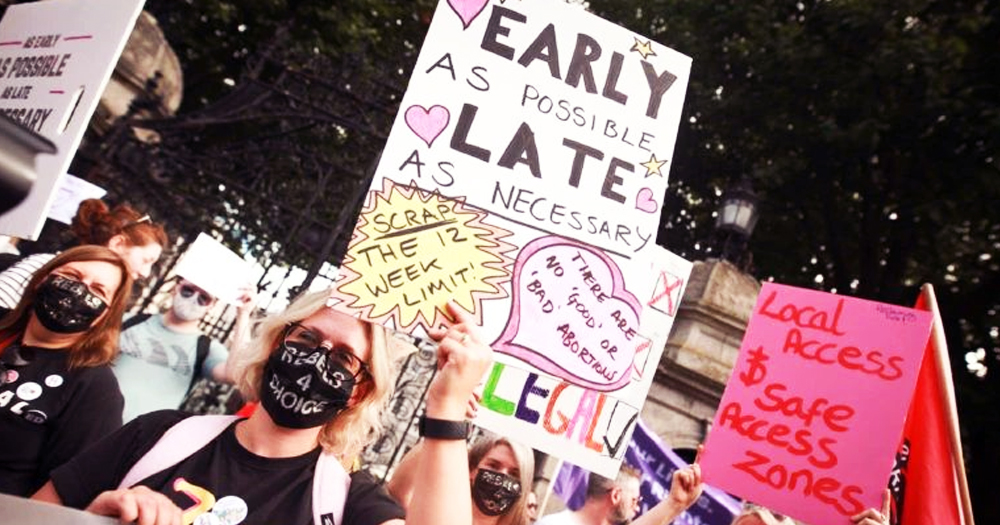Today marks the fourth anniversary of the day when the majority of Irish people voted ‘yes’ on the referendum to repeal the 8th amendment. Four years after, campaigners are calling on our government to take action to remove still existing barriers to abortion care in Ireland.
Politicians called it an “Irish solution to an Irish problem,” citing how completely unacceptable it was that people were forced to travel outside of Ireland in order to access healthcare. The 8th amendment was inserted in the Irish Constitution in 1983 and it introduced the equal right to life of the mother and the unborn child, virtually forcing pregnant people to travel to the UK for abortions or to buy illegal and potentially dangerous pills online.
After decades of intense campaigning, in a historic move, Ireland voted in favour of repealing the 8th amendment, effectively taking the decision to decriminalise abortion in the country. Now, four years later, the battle for safe and accessible abortion care in Ireland is apparently not over yet, as many people still face barriers in accessing these services.
A research conducted by the Abortion Rights Campaign (ARC) found that many pregnant people are still forced to travel abroad to get an abortion because of the persistent barriers they encounter when they try to access services.
A legal right to abortion is meaningless if people still cannot access this type of healthcare. After gaining abortion rights from a legal point of view, now there is a need to focus on practical access to services and remove the barriers that limit the freedom of some pregnant people to get an abortion.
Four years ago today, Ireland #RepealedThe8th.
Now it's time to #RepealTheDeal.
Our new National Maternity Hospital must be public and secular. #NMHSellout pic.twitter.com/KCN4x2gBLy— OurMaternityHospital #MakeNMHOurs #CACOWH (@OurMatHosp) May 25, 2022
ARC co-convener Darina Murray said that, “While thousands of people have been able to access abortion care here, at home, since 2019, our legislation is full of medically unnecessary barriers”.
Her organisation identified four main barriers that prevent access to abortion care.
Lack of local provision
The first thing we need to acknowledge is that, for some people, travelling to places that provide abortion care is not as easy as for others. This barrier disproportionally affects people living in rural Ireland, disabled people, working-class people, migrants, and people living in Direct Provision.
“Our research shows that people need to travel for 4-6 hours for abortion care, particularly those living in rural areas. This is significantly longer than they usually travel for healthcare appointments,” said Murray, highlighting the need to bridge these gaps in abortion provision.
Unnecessary waiting periods
After booking an appointment, a person who wishes to get an abortion has to face a mandatory 3-day waiting period before a second appointment is scheduled. In the words of Darina Murray, “It is 2022, yet we still do not trust pregnant people to know what is best for them. The 3-day wait is nothing more than paternalistic nonsense, which the World Health Organisation states ‘can jeopardise women’s ability to access safe, legal abortion services and demean women as competent decision-makers.'”
#UnfinishedBusiness #NoOneLeftBehind 4 years. Still so much to change. pic.twitter.com/kzcUTnKuEf
— Dundalk for Change ???️? (@Dundalk4Change) May 25, 2022
Lack of safe access zones
Murray continued by saying: “Nine out of our 19 maternity hospitals and maternity units still do not provide full abortion services, and only one in 10 GPs are abortion providers.” She explained that this is the consequence of giving doctors the option of ‘conscientious objection’ and allowing them to refuse care.
Moreover, she explained that there is a lack of safe access zones where pregnant people can be sure to access medical services without being harassed. “When we said we wanted free, safe, legal, local and accessible abortions, the local part was not an added extra. Local access is vital to ensure that people can have the abortions they need when they need them,” she stated
There is much unfinished business and if we are to ensure equitable and fair #abortionaccess we must:
– Decriminiliase abortion
– Remove the mandatory 3 day wait period
– Changes to fatal foetal anomoly legislation
– Improved data capture #UnfinishedBusiness #repeal @OrlaNWCI pic.twitter.com/45tTW5conM— Womenscouncilireland (@NWCI) May 25, 2022
Restrictions leading to denial of care
As Murray explained: “We also know that in instances where abortion pills have failed, and a person’s pregnancy has passed the 12-week on request limit, they cannot complete their abortion in Ireland unless they meet the criteria for an abortion post 12 weeks.”
She reported that the organisation Abortion Support Network supported more than 50 people who had to travel in order to complete abortions that were started in Ireland but had failed. She said that these examples were “essentially state-sponsored medical negligence”.
Removing these barriers to abortion care in Ireland is of fundamental importance if we want to ensure everyone has the freedom to decide whether they want to carry out pregnancy or not. “Abortions must be available on request throughout pregnancy for everyone. Pregnant people must be able to have abortions as early as possible and as late as necessary. Anything less leaves far too many people behind and denies pregnant people their reproductive rights,” Murray concluded.
© 2022 GCN (Gay Community News). All rights reserved.
Support GCN
GCN is a free, vital resource for Ireland’s LGBTQ+ community since 1988.
GCN is a trading name of National LGBT Federation CLG, a registered charity - Charity Number: 20034580.
GCN relies on the generous support of the community and allies to sustain the crucial work that we do. Producing GCN is costly, and, in an industry which has been hugely impacted by rising costs, we need your support to help sustain and grow this vital resource.
Supporting GCN for as little as €1.99 per month will help us continue our work as Ireland’s free, independent LGBTQ+ media.
